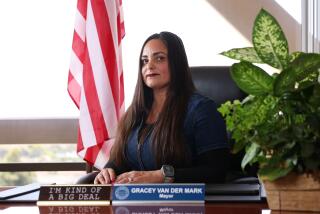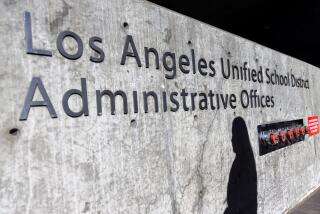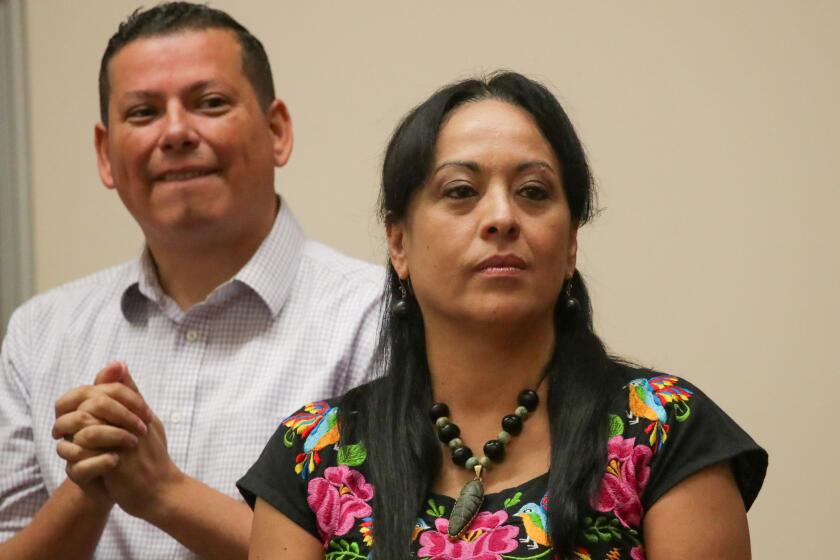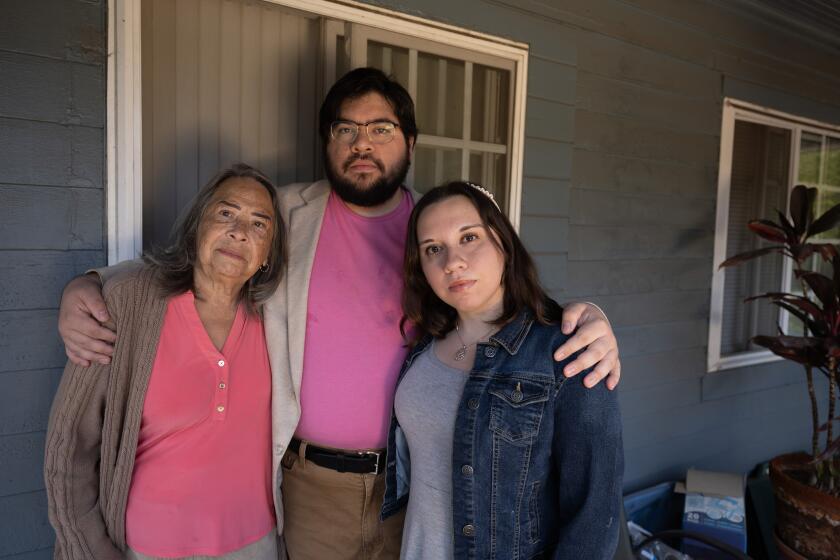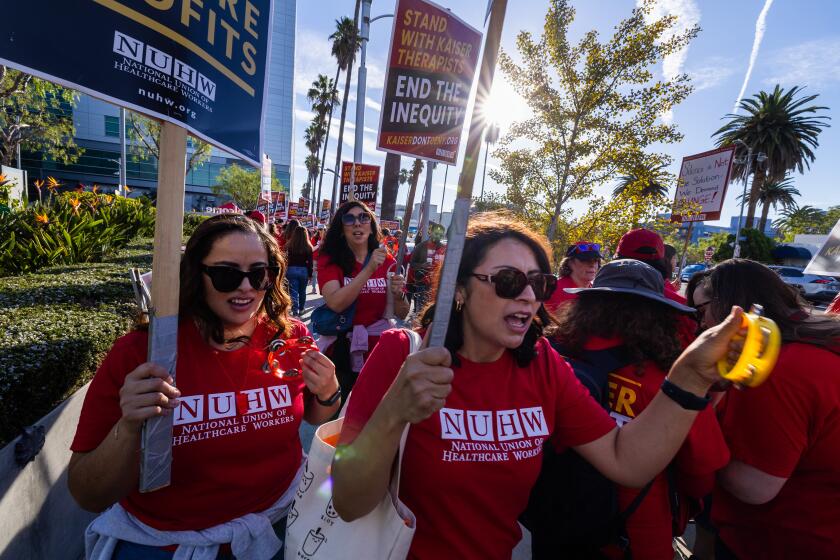Lawsuit takes on California teachers’ job protections
Local school districts, state legislators and even a California governor have tried to limit teachers’ job protections, among the most generous in the country. Efforts have all failed to rid public schools of ineffective teachers by making it easier to fire them and tougher for them to gain tenure and by stripping them of seniority rights.
Now proponents are taking their fight to another venue: the courtroom.
A Los Angeles County Superior Court judge will hear arguments this week over the constitutionality of laws that govern California’s teacher tenure rules, seniority policies and the dismissal process — an overhaul of which could upend controversial job security for instructors.
The lawsuit, filed by the nonprofit, advocacy group Students Matter, contends that these education laws are a violation of the Constitution’s equal protection guarantee because they do not ensure that all students have access to an adequate education.
Vergara versus California, filed on behalf of nine students and their families, seeks to revamp a dismissal process that the plaintiffs say is too costly and time consuming, lengthen the time it takes for instructors to gain tenure and dismantle the “last hired, first fired” policies that fail to consider teacher effectiveness.
The lawsuit aims to protect the rights of students, teachers and school districts against a “gross disparity” in educational opportunity, lawyers for the plaintiffs said.
The debate over teacher effectiveness has become increasingly contentious in recent years as school systems, including the Los Angeles Unified School District, try to link students’ standardized test scores to instructors’ evaluations, rather than keep using reviews in which no test data are included and nearly all teachers are rated as satisfactory. The dismissal process also has come under fire in recent years for the difficulty it causes school districts that seek to fire teachers accused of misconduct against students.
Teachers unions have vigorously defended tenure, seniority and dismissal rules, calling them crucial safeguards and essential to recruiting and retaining quality instructors. The lawsuit, they contend, is misguided and ignores the true causes of problems in education, such as drops in state funding.
“If you give teachers resources and appropriate class sizes, principals and superintendents that support them — they will be successful in increasing student achievement,” said Jim Finberg, an attorney representing the California Teachers Assn.
Finberg said wealthy benefactors and special interests are attempting to use their money to force their policy views on the state.
“California teachers care deeply about students and welcome a policy debate on how best to improve California schools,” he said. “But that debate should be in the Legislature, not in a courtroom.”
The plaintiffs, meanwhile, will try to prove that the laws themselves prevent administrators from removing ineffective teachers, thus lowering the quality of the teacher pool and contributing to an inadequate education for some students.
And the courthouse is just the place to do that, their attorneys said.
“The job of the court is to make sure the laws don’t hurt kids,” said Marcellus McRae, an attorney for the plaintiffs.
Theodore J. Boutrous Jr., who also represents the plaintiffs, said the laws far exceed reasonable job protections and create an environment in which ineffective teachers are immune to scrutiny and consequences for poor job performance. Many students — overwhelmingly those who are minority and low-income — are destined to suffer from ineffective and unequal instruction because administrators are unable to remove ineffective teachers from schools, he said.
“It is virtually impossible to get them out of the system,” Boutrous said.
The California Department of Education defended the laws. It contends that districts have the opportunity and discretion to remove ineffective teachers from classrooms and to decide whether to grant tenure.
“There is nothing in the law that prevents districts from making sure unqualified or unsuitable teachers don’t become permanent, just as there is nothing that prevents them from removing teachers from the classroom when necessary,” the department said in a written statement. “In fact, as the evidence will show, it’s quite the opposite.”
L.A. schools Supt. John Deasy, who declined to comment because he is a witness in the case, is a supporter of the effort to repeal the statutes. The lawsuit initially targeted the Los Angeles Unified School district and two other school systems, as well as California officials and state government. But the organization instead decided to focus on the state, dropping L.A. Unified.
In a recorded deposition, Deasy expressed frustration about having little time to decide whether to grant tenure to a teacher and about the laborious, expensive process of dismissing them.
“Once we determine a teacher is ineffective, I have to question how long should students be in front of an ineffective teacher and have their right to an education denied,” he said.
Proponents, however, see the Legislature as beholden to the interests of teachers unions and feel they would not be successful there. Bills in the past have failed. An initiative effort by then-Gov. Arnold Schwarzenegger also was defeated.
If they lose, supporters could seek another avenue in the form of a ballot initiative — hoping that voters side with them.
Students Matter was founded by Silicon Valley entrepreneur David F. Welch, a research scientist who went on to co-found Infinera, a manufacturer of optical telecommunications systems based in Sunnyvale, Calif. The group is partly funded by organizations known for battling teachers unions. The foundation of Los Angeles philanthropist Eli Broad, which has backed numerous education initiatives, also supports it.
The group hired a high-profile legal team to argue its case. It includes Boutrous, a partner at Gibson, Dunn & Crutcher, and Theodore B. Olson, a former U.S. solicitor general in the George W. Bush administration. Olson argued Bush v. Gore, over the contested 2000 presidential election, before the U.S. Supreme Court. Along with Boutrous, Olson also represented activists who sought to overturn California’s ban on gay marriage.
The plaintiffs and their attorneys declined to say how the challenged laws should be replaced, insisting that they seek solely to invalidate them. If they prevail, it would be up to all the stakeholders to develop better laws, Boutrous said.
In his deposition, Deasy said the single most important issue in student learning is the effectiveness of the teacher.
“The future of our students depends on their ability to have the best and brightest instructors,” he said.
Times staff writer Howard Blume contributed to this report.
More to Read
Sign up for Essential California
The most important California stories and recommendations in your inbox every morning.
You may occasionally receive promotional content from the Los Angeles Times.
